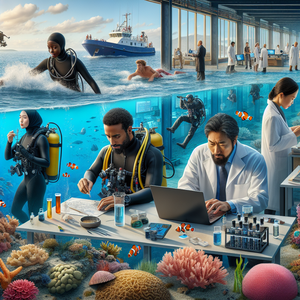Oceanic Alchemy: Transforming Marine Resources into Sustainable Solutions

Marine biotechnologists are at the forefront of a revolutionary endeavor, leveraging the ocean's vast resources to meet some of humanity's most pressing needs. Central to this endeavor is the extraction of bioactive compounds from marine life. These compounds, with their unique and often unparalleled structures, hold the promise of revolutionizing a multitude of industries. The ocean's biodiversity, encompassing everything from microscopic algae to colossal whales, offers an endless source of inspiration and innovation.
Innovative Processes and Applications
One of the most promising applications of marine biotechnology is in agriculture. Marine-derived bioactive compounds are being developed into biopesticides and biofertilizers, offering natural and sustainable alternatives to traditional chemical inputs. For instance, algal extracts have demonstrated the ability to enhance plant growth and resistance, leading to healthier crops and increased yields. This not only benefits farmers economically but also contributes to sustainable food production by reducing the reliance on synthetic chemicals that can harm the environment. The pharmaceutical industry stands to gain immensely from the advancements in marine biotechnology. Marine organisms are a rich source of bioactive compounds with potential therapeutic applications. For example, compounds derived from sea sponges have shown promising anticancer properties, paving the way for new cancer therapies. Moreover, marine algae have been found to exhibit antiviral properties, generating interest in their potential use against viral infections. These discoveries underscore the ocean's potential as a reservoir for groundbreaking medical treatments. In the realm of cosmetics, the ocean is becoming an invaluable source of natural ingredients that cater to the growing demand for sustainable beauty solutions. Marine-derived compounds are increasingly being used in skincare products for their moisturizing, anti-aging, and UV-protective properties. Ingredients like seaweed and algae extracts are gaining popularity, providing consumers with natural, eco-friendly options that are gentle on both the skin and the environment. This shift not only meets consumer demand but also aligns with broader environmental goals.
Revolutionizing Green Technology
Beyond specific industry applications, the contributions of marine biotechnologists are fueling a broader green technology movement. By harnessing the ocean's resources in a sustainable manner, they are reducing our dependence on fossil fuels and other non-renewable resources. This paradigm shift is crucial in mitigating climate change and preserving the planet for future generations. The sustainable practices developed through marine biotechnology are setting new standards for environmental stewardship and innovation.
The concept of oceanic alchemy is transforming our approach to sustainability, offering innovative solutions derived from the ocean's vast resources. As marine biotechnologists continue to explore and unlock the potential of marine organisms, the possibilities for sustainable development across various industries are vast and varied. This new frontier in biotechnology not only promises economic growth but also emphasizes the importance of environmental stewardship. By harnessing the power of the ocean, we are paving the way for a greener, more sustainable future, where the delicate balance between progress and preservation is maintained. In doing so, we are not only tapping into the ocean's potential but also ensuring its protection and sustainability for generations to come.
Marine Biotechnologist: Bioactive Compound Researcher
Novartis, BASF, and Merck
Responsibilities
Conduct research on marine organisms to identify and isolate bioactive compounds.
Collaborate with interdisciplinary teams to develop applications in pharmaceuticals, agriculture, and cosmetics.
Utilize advanced analytical techniques such as mass spectrometry and chromatography.
Agricultural Biotechnologist: Marine-Derived Solutions Specialist
Syngenta, Bayer Crop Science, and Monsanto
Responsibilities
Develop biopesticides and biofertilizers from marine sources to enhance crop resilience.
Implement field trials to assess the efficacy and safety of marine-derived agricultural products.
Engage with regulatory bodies to ensure compliance with environmental standards.
Pharmaceutical Marine Scientist: Drug Discovery Innovator
Pfizer, GlaxoSmithKline, and Eli Lilly
Responsibilities
Focus on the discovery and development of novel drugs from marine organisms.
Perform bioassays and screenings to evaluate the therapeutic potential of marine compounds.
Lead projects in collaboration with universities and research institutions.
Cosmetic Chemist: Marine Ingredient Developer
Estee Lauder, L'Oreal, and Johnson & Johnson
Responsibilities
Formulate skincare products using marine-derived compounds with anti-aging and UV-protective properties.
Conduct stability and efficacy testing of marine-based cosmetic formulations.
Keep abreast of trends in sustainable and natural beauty products.
Sustainable Technology Engineer: Ocean Resource Utilization Specialist
Siemens, General Electric, and Vestas
Responsibilities
Design technologies to harness marine resources for sustainable energy and materials.
Develop innovative methods to reduce environmental impact and enhance resource efficiency.
Collaborate with environmental scientists to ensure compliance with sustainability standards.


